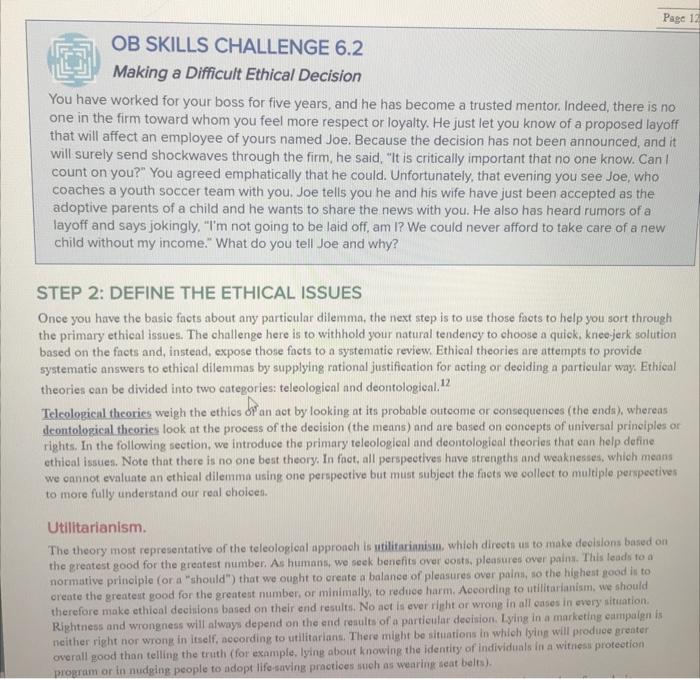OB SKILLS CHALLENGE 6.2 Making a Difficult Ethical Decision You have worked for your boss for five years, and he has become a trusted mentor. Indeed, there is no one in the firm toward whom you feel more respect or loyalty. He just let you know of a proposed layoff that will affect an employee of yours named Joe. Because the decision has not been announced, and it will surely send shockwaves through the firm, he said, "It is critically important that no one know. Can I count on you?" You agreed emphatically that he could. Unfortunately, that evening you see Joe, who coaches a youth soccer team with you. Joe tells you he and his wife have just been accepted as the adoptive parents of a child and he wants to share the news with you. He also has heard rumors of a layoff and says jokingly. "I'm not going to be laid off, am I? We could never afford to take care of a new child without my income." What do you tell Joe and why? STEP 2: DEFINE THE ETHICAL ISSUES Once you have the basio facts about any particular dilemma, the next step is to use those facts to help you sort through the primary ethical issues. The challenge here is to withhold your natural tendency to choose a quick, knee jerk solution based on the facts and, instead, expose those facts to a systematic review. Ethical theories are attempts to provide systematic answers to ethical dilemmas by supplying rational justification for acting or deeiding a particular way. Ethical theories can be divided into two categories: teleological and deontological. 12 Telcological theories weigh the ethics of an act by looking at its probable outcome or consequences (the ends), whereas deontological theories look at the process of the decision (the means) and are based on concepts of universal principles or rights. In the following section, we introduce the primary teleologieal and deontological theories that ean help define ethical issues. Note that there is no one best theory. In faet, all perspectives have strengths and weaknesses, which means we oannot evaluate an ethical dilemma using one perspective but must subject the facts we collect to multiple perspeetives to more fully understand our real choices. Utilitarianism. The theory most representative of the teleological approneh is utilitarianisw. which directi us to make deelslons based on the greatest good for the greatest number. As humans, we seek benefits over costs. pleasures over pains. This leads to a normative prinelple (or a "should") that we ought to ereate a balance of pleasures over painn, so the highest good in to oreate the greatelt good for the greatent number, or minimally, to reduce harm. Acoording to utilitiarianism, we should therefore make ethionl deciulions based on their end results. No act is ever rieht or wrong in all eases in every sittiation. Rightness and wrongness will always depend on the end reault of a partieular deeision. Lying in a marketing eampaign is neither right nor wrong in itself, according to utilitarians. There might be situations in which lyitig will produce greater overall good than telling the truth (for example, lying about knowing the identity of individuals itf a witness protection program or in nudging people to adopt life-saving practioes sureh as wearing ceat belts)







